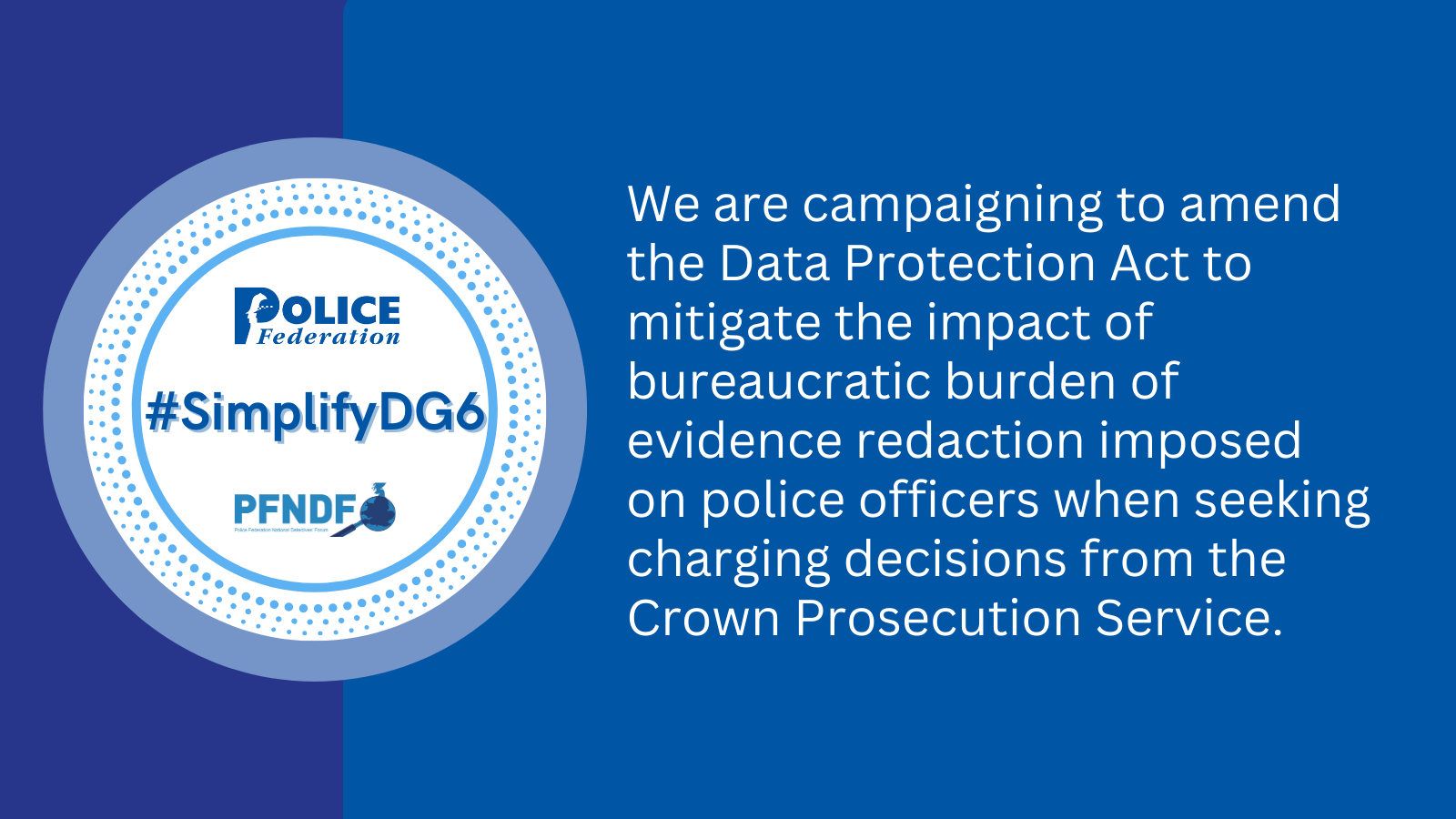The Government must urgently adopt the Police Federation of England and Wales’ amendment into the Data Protection and Digital Information Bill if it is to achieve the maximum efficiency savings set out in its launch of a new public sector productivity plan.
In this year's Budget [6 March], the Chancellor announced a landmark public sector productivity plan in a bid to secure cash-releasing savings by investing in technology to cut administrative burden.
However, the plan has the potential to become even more successful if the Government supports PFEW’s #SimplifyDG6 campaign.
On average, since 1 January 2021, 365,000 policing hours have been consumed annually in redacting case files pre-charge. At a PC’s pay point 4, this costs taxpayers £5.64 million per year.
PFEW has a feasible, legally approved, drafted clause ready to be adopted into the Data Protection and Digital Information Bill, with the support of Jane Hunt MP, who sits on the Bill’s committee. This would simplify the redaction obligations placed on police officers, freeing up thousands of hours.
Police Federation of England and Wales National Chair Steve Hartshorn said: “We were sighted on the Police Funding Settlement in December, which was ratified in January.
“Our stance remains it is extremely disappointing the Government simply refuses to acknowledge the acute resource crunch our forces are facing and continues to handout short-term funding arrangements.
“Taking into account the rise in police officer numbers on the back of Police Uplift Programme, the settlement is the worst financial support forces have received in recent years.”
The Government’s claim of forces getting up to £922 million extra funding for 2024/25 falls flat when considered against the payroll commitment for 233,832 full-time equivalent workforce as of 31 March 2023 (officers, staff, police community support officers and designated officers).
This will reduce the funding by more than half for chief officers to cover the day-to-day cost of ongoing policing projects and keep their heads above the water while seriously hampering our forces’ ability to initiate long-term crime.
Mr Hartshorn continued: “In today’s Budget, the Chancellor stated it isn’t fair to ask taxpayers to pay more for public services, yet police and crime commissioners are still having to choose to take more money from local residents who have already paid for policing in taxes at a time when the cost of living is still biting hard on many.
“The 1 per cent increase in public spending is a small step in the right direction, but there must be sustainable and long-term funding from central Government.
“PFEW is keen to work with the Government to find solutions that could save public funds and drive overall efficiencies of our forces; therefore, we welcome the new public sector productivity plan.
“This must go further beyond the money saving technology outlined today, though, in order to accrue maximum efficiency savings to reinvest into the service, take the burden off taxpayers and give the public the very best service they deserve.”
Ben Hudson, chair of the Police Federation National Detectives’ Forum, stated: “I urge the Government to adopt our amendment into the Data Protection and Digital Information Bill.
“The proposed clause would have no obvious disadvantages. Security of personal data would not be compromised. The redactions, which are needed to protect our personal data would still be undertaken, however this would be done at the appropriate stage.
“Most importantly unnecessary redaction would be avoided; which is everything we have been looking to achieve.
“Adopting this approach enables the Government to demonstrate they are supporting policing and freeing up thousands upon thousands of policing hours nationally for our members to dedicate their services to front line policing.
“For chief constables this would mean their officers are back within their communities rather than being stuck at computers, and our members would be able to do what they joined up for; serve the public, keep them same safe and prevent and detect crime.”
On Sunday [21 January] the Daily Mail revealed for the first time why the Government did not support the amendment.
According to the Daily Mail report, the Government refused to support the amendment as the Information Commissioners’ Office (ICO) was opposed to a “bid to exempt police from sharing unredacted data with prosecutors”.














